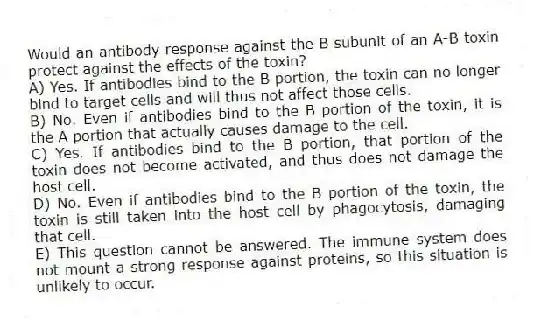
Would an antibody response against the B subunit of an A-B toxin protect against the effects of the toxin?
A) Yes. If antibodies bind to the B portion, the toxin can no longer bind to target cells and will thus not affect those cells.
B) No. Even if antibodies bind to the B portion of the toxin, it is the A portion that actually causes damage to the cell.
C) Yes. If antibodies bind to the B portion, that portion of the toxin does not become activated, and thus does not damage the host cell.
D) No. Even if antibodies bind to the B portion of the toxin, the toxin is still taken into the host cell by phagocytosis, damaging that cell.
E) This question cannot be answered. The immune system does not mount a strong response against proteins, so this situation is unlikely to occur.
Correct Answer:
Verified
Q75: The period of time between exposure to
Q76: Select the INCORRECT definition regarding the progression
Q77: The length of the incubation period depends
Q78: You explain to Jay that infections and
Q79: You describe to Jay the initial events
Q81: A young couple brings their 3-month old
Q82: Finally, you use a diagram to illustrate
Q83: A young couple brings their 3-month old
Q84: A young couple brings their 3-month old
Q85: You explain to Jay that some pathogens induce
Unlock this Answer For Free Now!
View this answer and more for free by performing one of the following actions

Scan the QR code to install the App and get 2 free unlocks

Unlock quizzes for free by uploading documents